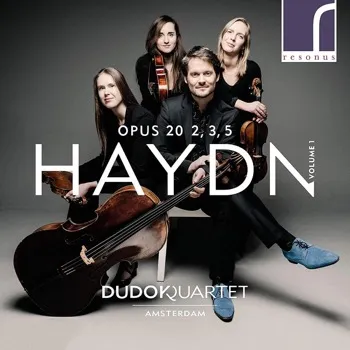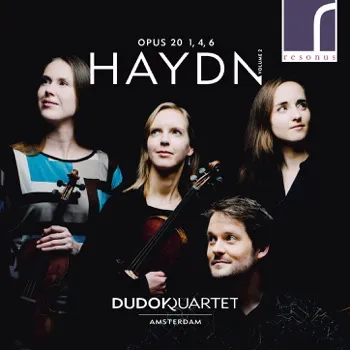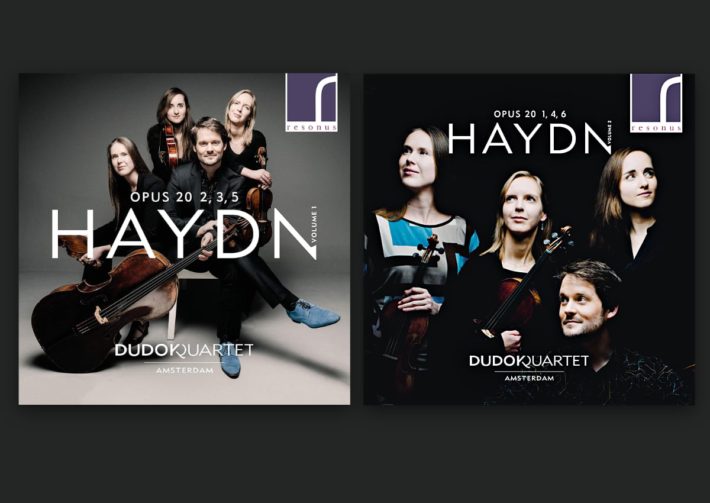Haydn’s Quartets pose several questions when being recorded; should it be a complete opus and if so, in what order. In 2019, Quatuor Hanson demonstrated a profound knowledge with a creative program that contained a snapshot of the composer’s œuvre (see our review). The London Quartet, in their single release of Haydn’s Op. 20, programmed the Quartets in numerical order, whilst the Doric Quartet produced a thoughtful program ending with the A major. The Dudok Quartet Amsterdam released their Op. 20 in two separate albums. Their first disc, recorded in May 2019, programmed Quartets 2,3 and 5; their second album completes the opus with Nos. 1, 4 and 6 and was recorded in August of the same year.


From the first notes of the first volume (The G minor Quartet), the Dudok’s sound sets them apart. Richer than the London Haydn Quartet but more elegant than the Doric Quartet, who are more akin to the Lindsays. The first and last movements are bold and are two of the most spirited movements of the set. The C major String Quartet brings sunshine sandwiched between the two contrasting minor Quartets, though not without its darker moments. The Dudok find a yielding warmth throughout, whilst the Doric are brighter in tone and bring a more angular approach. Concluding the first volume with the F minor Quartet, this performance delicately highlights both the lighter and darker moments, often starkly and abruptly juxtaposed. The fugue, which forms the final movement, has a reserved character, ending quite enigmatically. By contrast, Quatuor Hanson are more certain overall, with stronger dynamics and rhythmic drive.
Turning to volume 2, the Dudok open the allegro moderato of the E-flat Quartet sprightly, bringing a transparency to the textures. I’ve found this performance particularly successful, communicative and commanding. the D major Quartet, Even more than the previous performances of Op. 20, reveals an exceptional level of unity between the players, and the stylish playing makes them a pleasure to listen to. The minuet and trio have the occasional, stylish embellishment, creating an air of spontaneity. The presto scherzando brings vivacity in this mostly serious reading.
The final Quartet of the set, in A major, is full of light, sunshine and warmth. The first movement has energy and momentum, and the cantabile of the slow movement is apparent. Here I occasionally felt that the phrasing doesn’t fully allow the melodic line to sing, even though the underpinning accompaniment is sensitively balanced. But the brief Minuet and trio are executed with innovative dynamics, and the gentle rubato shapes it into something whimsical and enchanting. The finale is another fugue, providing a fascinating way to conclude the program, echoing that of the Doric.
The Dudok play on gut strings and customized bows (which the booklet only says are “classical” bows). This instrument choice brings a very different quality from Quartet Mosaïques, famed for their period-instrument performances. The textures of the music are kept open and transparent, with a lighter cello line that comes to the fore as the music demands. They are not afraid to use gentle vibrato to color their sound, executed sympathetically, with consistency and style. This is far from light-hearted performances, for better or for worst; ornaments are unobtrusive so as not to detract from the melodic line, and phrasing is observed with sincerity to the markings, perhaps, occasionally, too rigidly. The famous Haydn humor is lacking on occasion, and in those cases the music is taken a little more seriously than other performances.
The recording of both volumes, captured in the same location (The Netherlands’ Muziekcentrum van de Omroep, Hilversum) – is not as closely recorded as the Doric, but the instruments are balanced more as one would hear them live. Overall, the Dudok give performances that are essential listening for any chamber music or Haydn fan, with elements of both period sound and modern performance practice.
Haydn – String Quartets Op. 20, No. 1-6
Dudok Quartet Amsterdam:
Judith Van Driel – Violin 1
Marleen Wester – Violin 2
Marie-Louise De Jong – Viola
David Faber – Cello
Resonus, CD RES10248 (volume 1), RES10262 (volume 2)





















